Furious Wife Kicks Out Husband After He Sold Her Cat Because It Was "Annoying" Him
Relationships are important—be it with friends, family, or significant others. The people involved should make a conscious effort to keep the relationship alive and strong.
Built with love, care, and trust, a relationship is strong but also fragile. It takes time for it to grow through the connections and experiences you share, but it can take just a few moments to be destroyed in the dust.
Trust is one of the most vital components of a relationship. It is the belief that the other person will do the right thing or that they will do everything in their power to choose the best option from the spectrum of choices.
Making decisions that may affect your relationship requires considerable time for contemplation, weighing the consequences of each choice. People most likely know their partners well enough to have a pretty good idea of what makes them happy or upset, right?
Being with someone you know and trust for a long time leads you to assume that they will always have your back or that they would never do anything you did not agree to. But alas, not all people think this way.
There are individuals—husbands—out there who, even after discussing and resolving matters with their partners, still manage to break their significant other’s trust. This particular one got kicked out of the house for what he did.
Here's what OP posted:
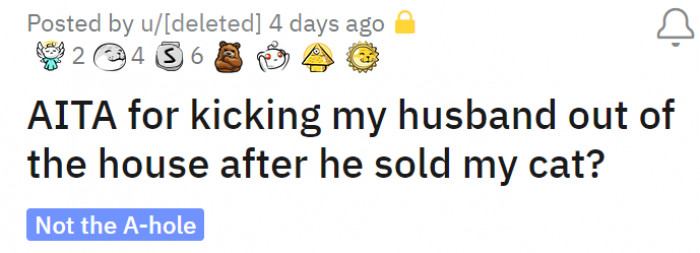
This couple has been together for 2 years, and they own a cat. The husband never complained about their new furbaby until recently.

He complains about their “annoying” cat... after a year of getting it, which confused OP.
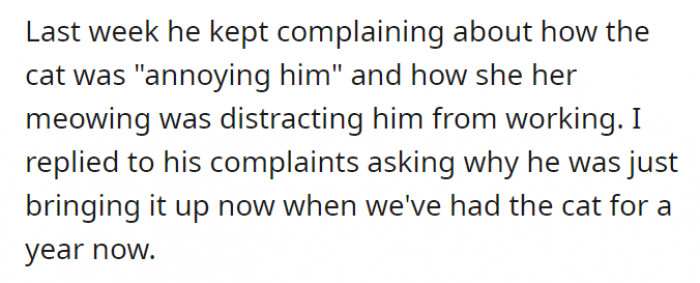
Understanding Emotional Attachments
Emotional attachments to pets can be deeply rooted in our psychological makeup. According to Dr. John K. Miller, a clinical psychologist, pets often serve as significant sources of emotional support and comfort, especially during times of stress.
Research shows that companionship with animals can trigger the release of oxytocin, the 'love hormone,' which facilitates bonding and emotional well-being.
When these attachments are disregarded, it can lead to feelings of betrayal and abandonment, mirroring deeper relational traumas.
Understanding the Emotional Response
Dr. Emily Carter, a clinical psychologist at Yale University, notes that the act of selling a partner's pet can reflect deeper issues of control and emotional disconnection.
This behavior often signifies unresolved conflicts in the relationship, highlighting a potential lack of empathy or understanding of the partner's emotional needs.
According to her research on emotional attachment, individuals who exhibit such controlling behavior may struggle to recognize the emotional significance of pets in their partner's life.
Turns out he was just putting up with it—Molly the cat—because of OP. Of course, she was mad because he never told her that.
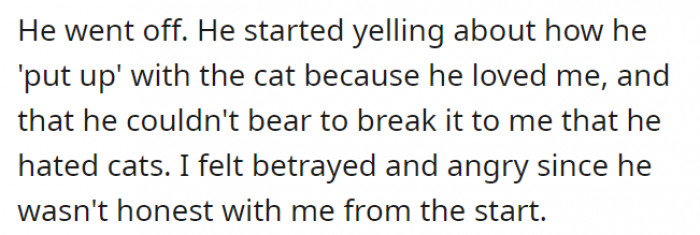
Their argument ended, and they came to the conclusion that Molly was going to be given to OP’s cousins since she was assured that they would care for her. At the same time, OP could easily visit and spend time with the cat. He agreed.
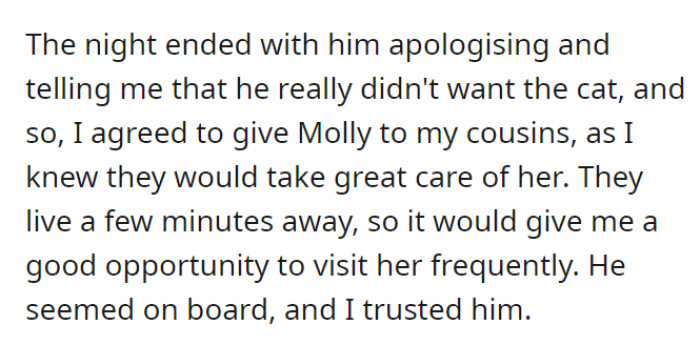
The cat is gone—the husband sold her cat on a website (Gumtree), and she was very upset, rightfully so!
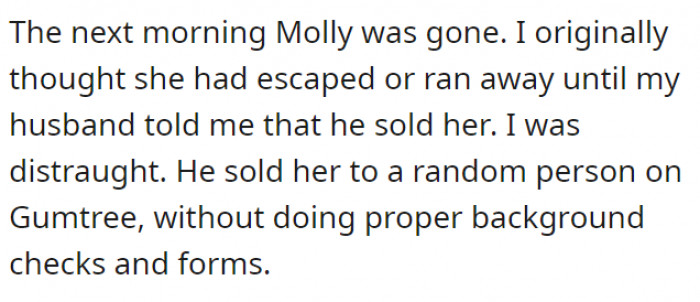
Behavioral studies indicate that pet ownership can positively influence mental health, providing a sense of routine and responsibility. A study published in the Journal of Personality and Social Psychology found that individuals with pets reported lower levels of anxiety and depression.
Such research highlights the psychological implications of dismissing a pet's role in one’s emotional landscape. For many, pets become a part of the family unit; thus, selling or giving away a pet can feel like severing a family bond.
A study highlighted by Dr. Laura Berman, a renowned sex therapist, emphasizes that pets often serve as vital emotional support, significantly influencing relationship dynamics. She states, "When one partner dismisses the emotional bond with a pet, it can trigger feelings of betrayal and anger, akin to losing a family member." This sentiment echoes the normal reactions experienced when a cherished pet is treated as expendable. Understanding these emotional responses can aid couples in navigating their feelings toward each other's actions more effectively.
She got rid of him. Kicked him out.
Just like that.

Here's what people have to say:
Quit the relationship. Enjoy life with the cat.
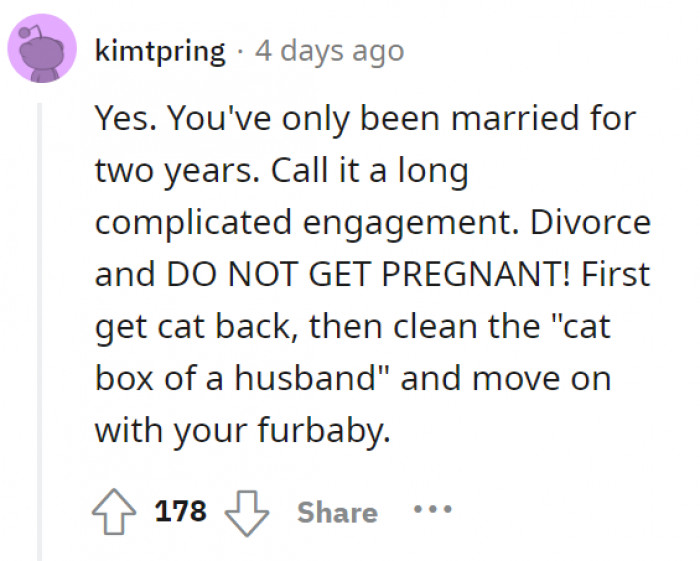
If OP’s not TA, then her husband is! Also, some tips to get your cat back in case this happens to you:
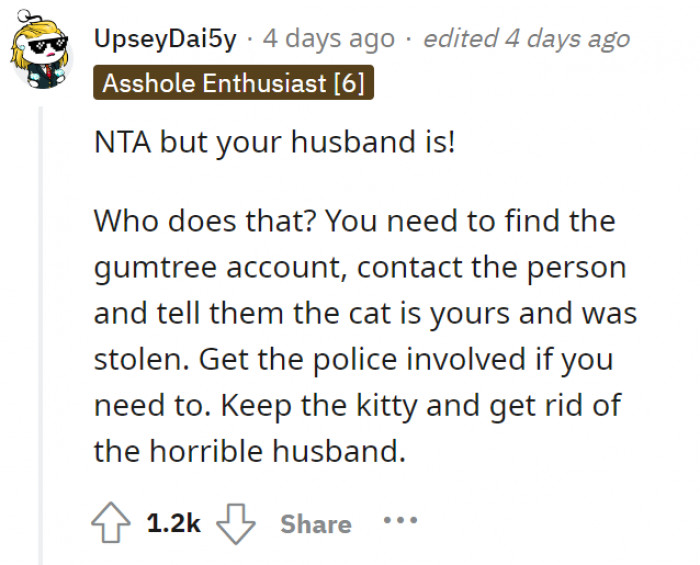
The Role of Conflict in Relationships
Conflict is a natural part of any relationship. However, how partners handle disagreements can reveal underlying patterns of communication and attachment.
According to research in the Journal of Marriage and Family, couples who engage in constructive conflict resolution tend to have stronger relationships. In contrast, those who resort to avoidance or contempt can lead to relational breakdowns.
In this case, the husband's actions suggest a lack of communication and a possible disconnect in values regarding family and emotional investments.
The Role of Communication in Relationships
Communication is vital for healthy relationships; however, emotional conversations can be uncomfortable.
Research suggests that partners often avoid discussing deeper emotional issues, opting instead for avoidance or conflict, which can exacerbate misunderstandings.
To improve communication, experts recommend using 'I' statements to express feelings rather than accusations, which can foster a more open dialogue.
OP made the right decision. He knows she didn’t want him to do what he did, but he still sold Molly anyway.

Swap the sold cat for the husband. Redditors don’t think she won’t make a lot of money from him, but at least he’s gone?

Put him up for sale!

To address these issues effectively, couples therapy can provide a safe space to explore underlying emotional triggers. A licensed therapist could help the couple navigate their feelings about the pet and each other's emotional needs.
Building empathy and understanding can help both partners articulate their needs better and find common ground, potentially repairing the rift caused by this incident.
In situations where one partner feels unheard, developing a structured approach to communication can be beneficial.
Studies indicate that actively listening and validating each other's feelings can significantly reduce conflict and restore emotional safety in relationships.
Couples therapy can also provide a safe space to explore these dynamics more deeply, guided by a professional.
Time to split. Not later, now.

How did he do that, though?
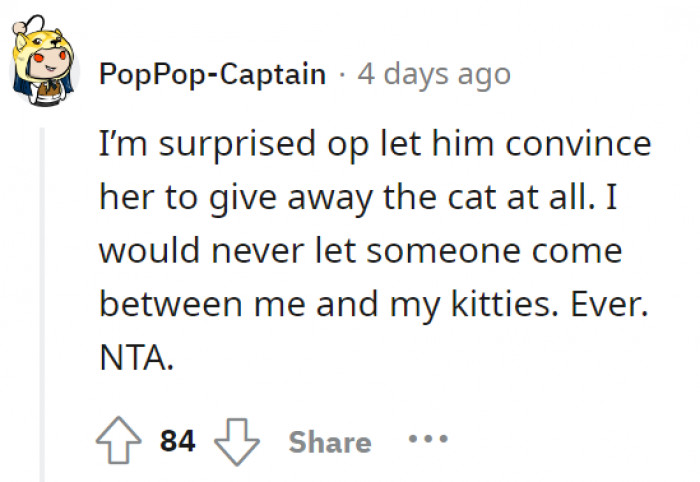
A scary thought, but something to ponder:
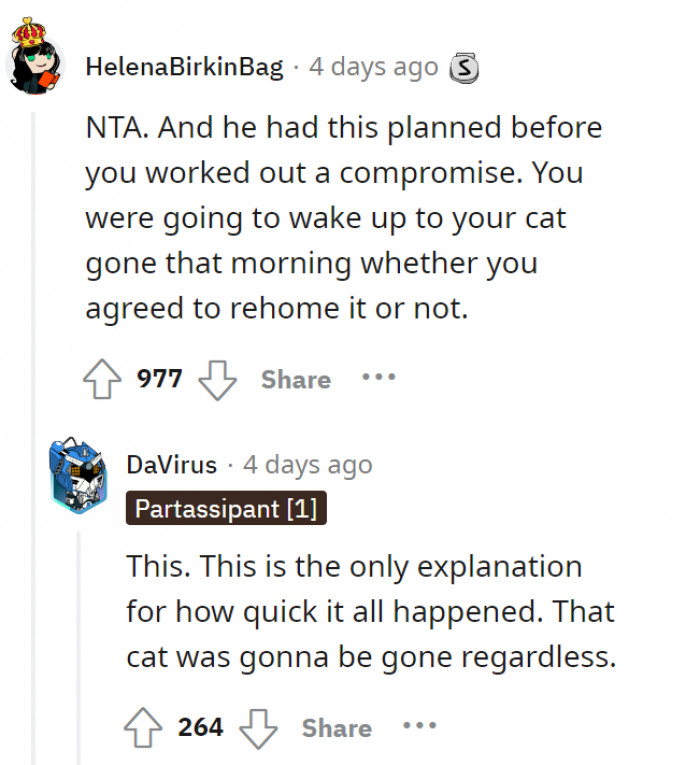
Understanding Attachment Styles
The attachment theory suggests that early relationships with caregivers shape our adult relationships.
Individuals with insecure attachment styles may display controlling behavior, fearing loss or rejection.
Acknowledging one’s attachment style and how it influences current behavior can be the first step toward healthier relationship dynamics.
On a more serious note, trusting someone and them doing this to you really sucks. It just proves that being able to trust someone cannot be measured by time.
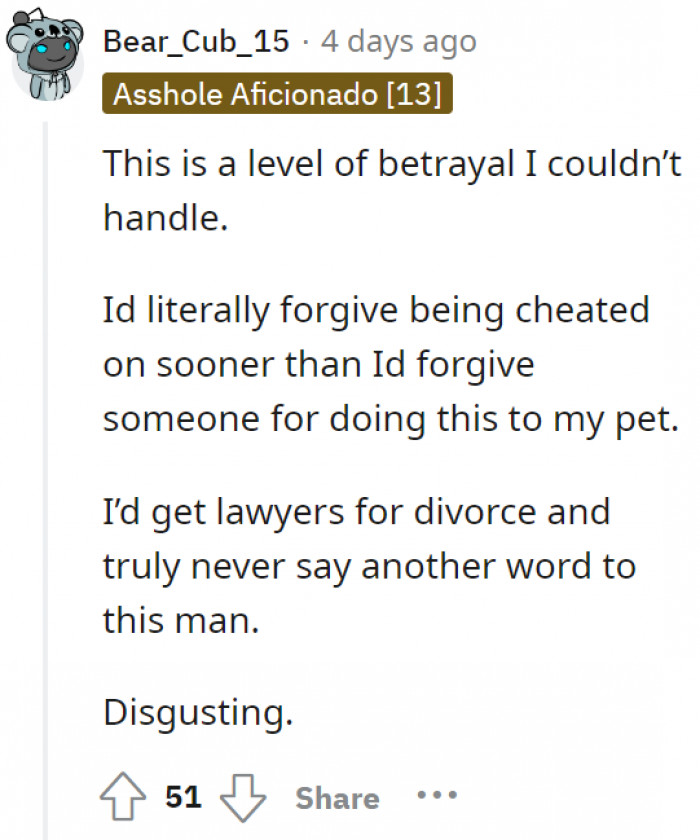
People out here pointing out some faults in the replies and coming up with solutions for said faults.
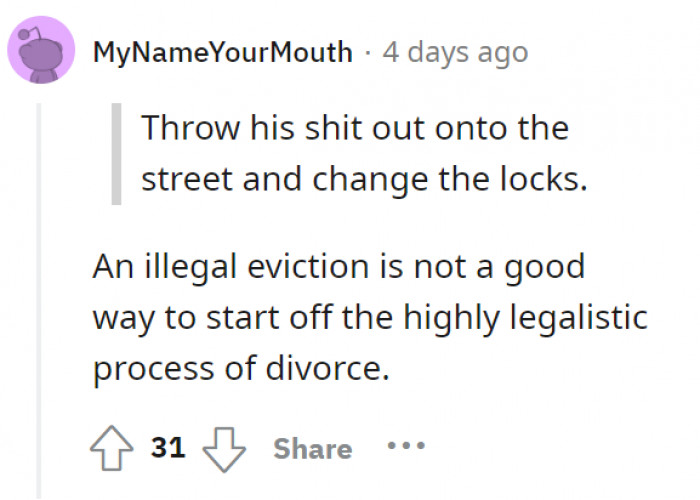
We're behind you, OP! Lol.

Therapists often recommend self-reflection exercises to help individuals become aware of their patterns.
Journaling about emotional triggers and responses can provide insights into how past experiences influence current behavior.
By understanding these patterns, partners can work together to cultivate a more supportive and understanding relationship environment.
No contemplation needed.

Can this be the actual reason for his actions? Not justifiable. At all.
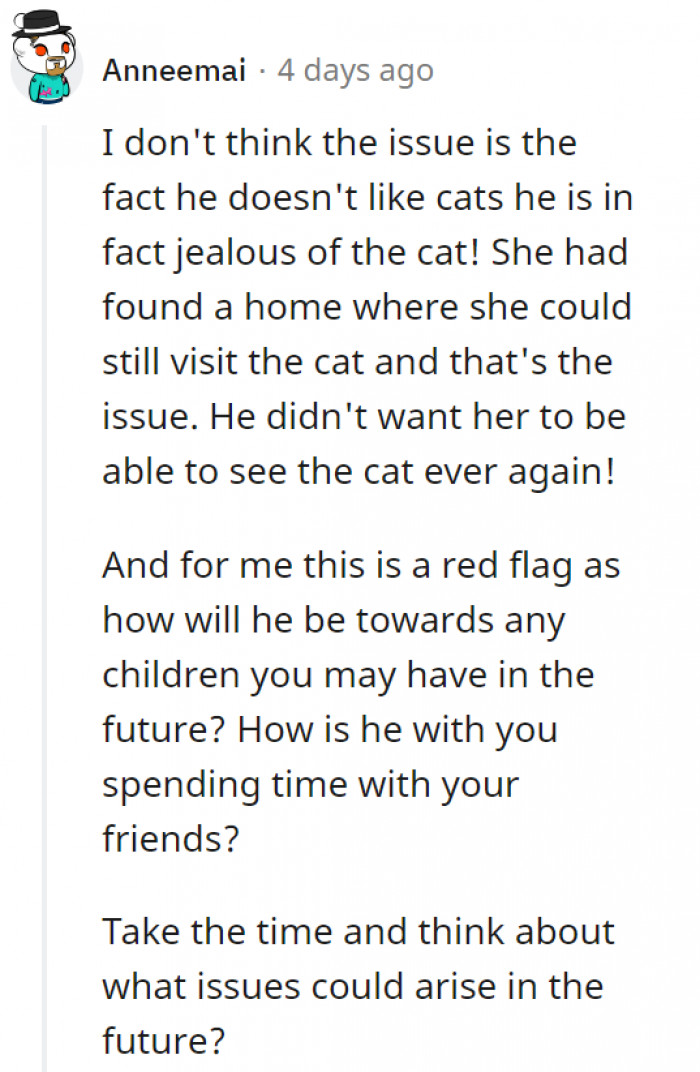
There is more to this incident. It’s not just the cat!!!
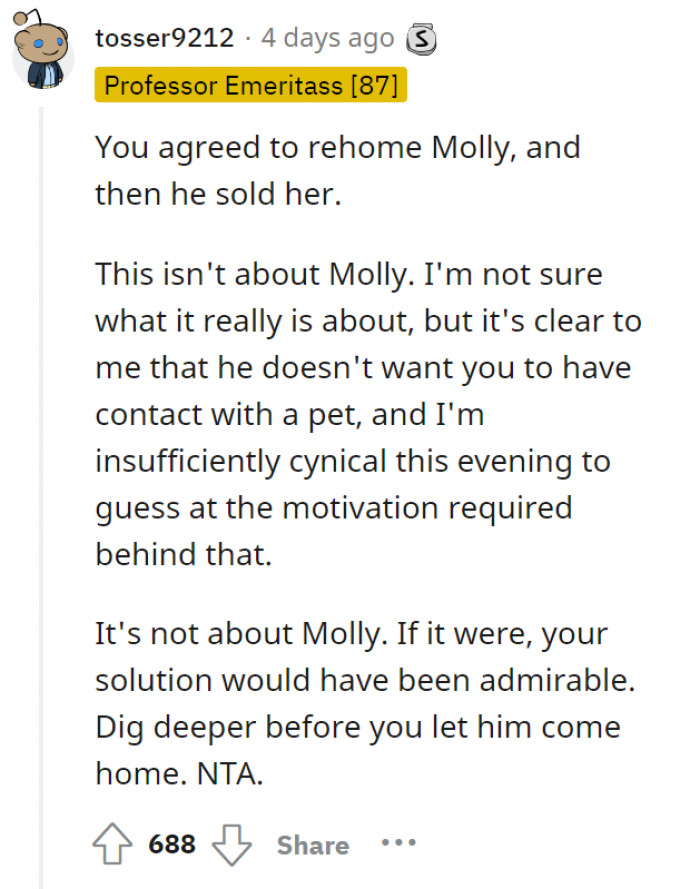
Practical Steps for Relationship Healing
Given the emotional upheaval caused by such incidents, couples should consider establishing a shared understanding of pet ownership responsibilities.
Setting clear boundaries and expectations about pets can prevent future conflicts and promote a sense of partnership.
Regular check-ins about each other’s feelings regarding pets can also enhance emotional connectivity and prevent misunderstandings.
Great tip, but thank the heavens Molly is found!

Here's an update:
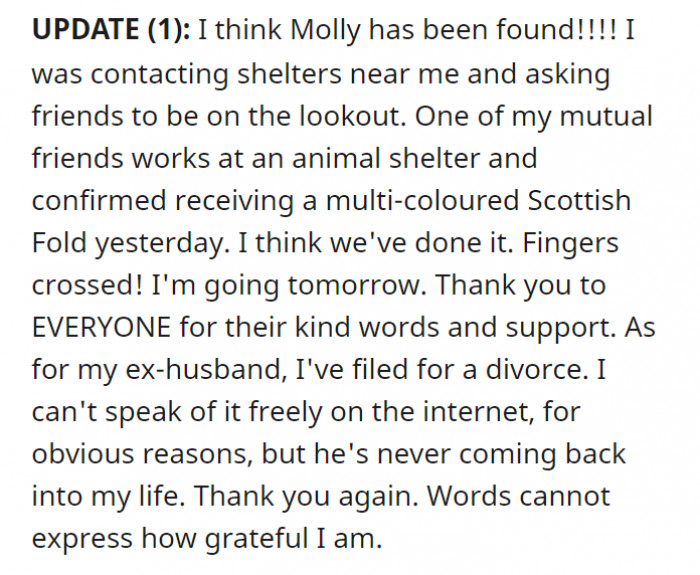
And another:
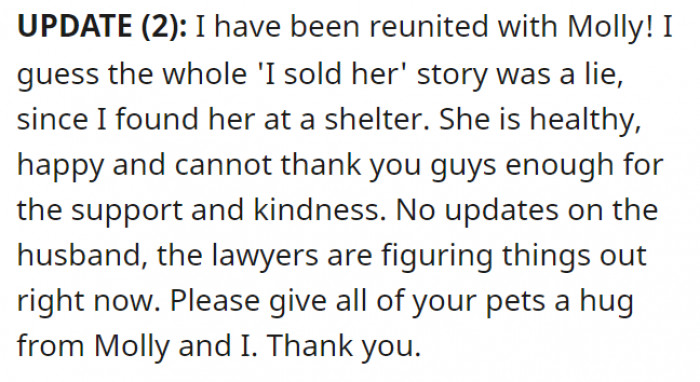
Finally, seeking couples therapy can be a proactive step toward healing.
Studies show that couples who engage in therapy report improved communication and relationship satisfaction.
Therapists can facilitate discussions around sensitive topics, helping partners learn to express their feelings in ways that foster understanding and empathy.
Having to come to an agreement only to find out that they didn’t keep their word—and did even more horrible things—is definitely a betrayal of trust. It just sucks that the 2 years of being together don’t compare to the deception OP has experienced.
Thank heavens that Molly was found—and the husband is out (literally)!
Comment down your thoughts or share this article for all your family and friends to see!
Psychological Analysis
This situation illustrates the complexities of emotional attachment to pets and how they impact interpersonal relationships.
When one partner feels their emotional investment is dismissed, it can lead to significant distress and conflict.
Recognizing and validating each other's feelings regarding pets is crucial for fostering a supportive relationship dynamic.
Analysis generated by AI
Analysis & Alternative Approaches
Behavioral specialists highlight that reactions to emotional issues surrounding pets are valid and deserve attention.
With the right interventions and communication strategies, couples can navigate conflicts and deepen their emotional connections.
Ultimately, healing and growth in relationships often come from understanding and addressing underlying emotional needs.
Analysis & Alternative Approaches
Understanding the emotional dynamics at play can foster healthier communication practices in relationships.
Psychological research emphasizes that acknowledging each other's feelings is key to conflict resolution and maintaining a strong partnership.
Ultimately, fostering empathy and respect for shared attachments, such as pets, can lead to deeper relational satisfaction.



